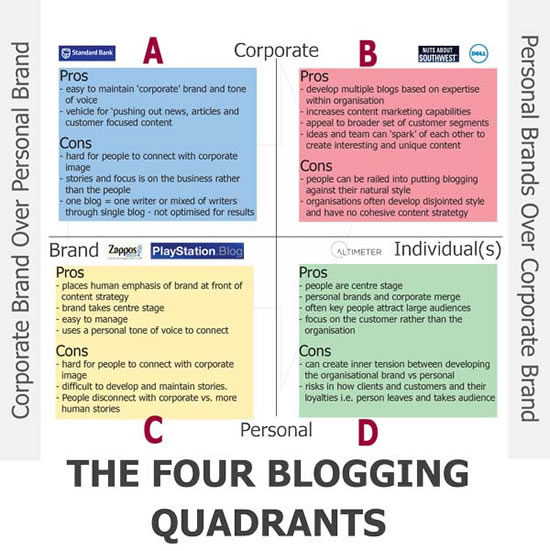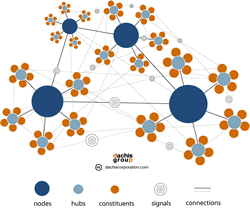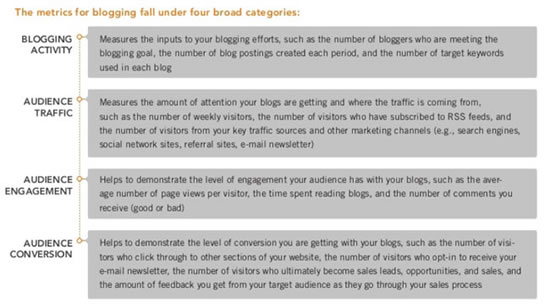
Many organizations that start using content marketing or social media marketing, and want to offer content in a more conversational and personal way, start their efforts with a blog. Although business blogging is far from new and lots of companies have a blog, several others don’t. It’s of course not a must but in practice there are relatively few reasons not to do it. Then, why should you do it? This business blogging guide provides the answers.
Note that there are many discussions regarding the value, future and even usefulness of business blogging in an era of “visual content” and even “content overload”.
Don’t get distracted by them and look at your customers, brand, people, narrative and focus. What do you stand for and what can you mean for your “ideal audiences”. That’s the challenge. At the same time: start simple. Focus on questions your – prospective – customers and other people really want to see answered before even considering to engage with you.
What are blogs really?
Blogs, short for web logs, are online platforms to create specific types of content, share them and interact with others around those content objects, known as blog posts.
They have a number of common features such as comment possibilities, trackbacks and a technology called RSS. The activation of all these characteristics is not a necessity. Business blogs or corporate blogs should focus on non-promotional and regularly updated content entries (posts).
They typically at least aim to attract prospective buyers and/or other stakeholders, provide information to pre-defined target audiences or buyer personas, and drive conversions, including social conversions. While the content typically is not directly promotional, business blogs obviously serve direct and indirect business goals.
Blogs are essential parts of most social media programs and still often the hubs of content marketing strategies. In practice we see this view of content marketing coming back in the approaches of many organizations: the blog(s) as the hub and different other channels and content formats as the spokes. Yet, the real hub of any content marketing strategy is the customer value which generates business value.
Corporate blogging serves multiple potential marketing goals
- Driving awareness.
- Providing the information – prospective – buyers need across their journey.
- Engage various target audiences, including journalists, for instance.
- Branding (all touchpoints have an important branding dimension).
- Generating leads (and managing them).
- Relationship building.
- PR, be it in a non-traditional sense.
- Influencer marketing.
- Feedback and listening.
- Community marketing.
- Driving traffic, subscriptions and registrations.
You can also use blogs to focus on non-marketing related business goals or forms of communication and interaction.

The business blogging reality: hubs and spokes
The social media and content marketing activities of many companies in reality are limited to driving interactions and conversions via blogs and the social platforms connected with them. Such social media and content marketing programs often are limited to publishing, listening, responding and acting with a central role for content, as shared via blogs.
Although social media and content marketing offer much more possibilities than blogging, the focus on content and blogs is natural. The majority of traffic to websites and of online generated leads comes from search engines. This is because search engines still are a predominant source for buyers during various stages of their buyer journey. Furthermore, blogs also get more consulted as people actively look for information during their buying journey and increasingly become social-savvy.

Content is a so-called social object: it’s what people discover, read or watch, share, comment on and talk about. It serves a social need, solves a pain, provides a human answer, it’s people-centric and so are blogs.
As said, blogs still often serve as the hubs of content as a social object and of content marketing as a strategic activity. This hub and spoke model is often depicted in a simple way but it’s better to look at it from a more connected and realistic perspective as in the model depicted on the right by Dachis Group, which David Armano covered on his blog many years ago.
14 business blogging success factors
Below are some important elements that determine the success of blogs.
They consist of several steps to take and some tips. Don’t be freightened by them: blogging is not rocket science but we like to be exhaustive.
- Outlining the desired outcomes and defining metrics and KPIs, in correlation with other marketing strategies.
- Identifying the target audiences, buyer personas and other stakeholders in a well-documented and customer-centric way.
- Mapping the (content) needs wants, preferences and more of target groups over time and preferences. While blogs will typically focus on questions prospective buyers have, there is more than strictly business. It’s about emotion and sometimes even about entertainment. Business should not be boring and the same goes for blogs. As long as it’s “you”, “them” and relevant.
- Aligning needs and desired outcomes and putting the proper processes and flows in place in a calculated way and by attributing the proper resources and foreseeing collaboration and planning tools such as editorial calendars.
- Inventorizing, creating and repurposing content that can serve needs, answer to pains, engage, drive to outcomes, appeal and seduce/convince in a blog format.
- Interacting with readers and other bloggers. Feeding the communities that form and engage existing communities of customers, prospects, collaborators, etc.
- Following up on the metrics for success while continuously testing and improving. Dare changing course and keep gathering feedback and making what you do better. Nobody is perfect.
- Applying some best practices regarding writing, content formats and more technical topics.
- Embedding the blog activities in a social context with a social content strategy in place. Such a strategy will typically look at the social media behavior of target audiences and enable easy sharing and interaction on the platforms that matter most.
- Integrating blogging activities in the overall content marketing, social media marketing, loyalty marketing, community marketing, lead generation, etc. strategies. Whatever the goals are in an individual context: corporate blogging and blog marketing are part of a broader context. This also implies integrations with various marketing tools such as marketing automation.
- Providing a consistent ‘reader’ and customer experience by applying storytelling techniques following the narrative, style, core story/message of the brand and the language and preferences of target audiences.
- Leaving the corporate blahblah behind and having people share their content in a personal way and being much less formal than this text is. It’s about people!
- Making it easy for bloggers, training them, empowering them and looking at their needs as well. Again, it’s about people. Unless they’re brainwashed no one will want to work more and longer just for the sake of working longer and more. There is a human quid pro quo and often it’s not about money.
- Planning, structuring and putting processes and guidelines in place (some call them ‘policies’) that focus on the empowerment of collaborators. However, don’t plan too much and leave room for employee collaboration, creativity and teamwork.

Why blogs matter – do you need one?
Not all organizations have a blog. Do they need to have one? Do you need one?
It depends as usual. However, there are several valid reasons to have a corporate blog and in deciding whether to have on or not (or to get some ideas on how to you use an existing one better), it’s good to know why corporate blogs (can) matter.
Discover some facts, dozens of reasons why corporate blogs matter and the place and role of corporate blogs in the social landscape. Needless to say that blogs also play an essential role in the digital content marketing strategy of several organizations.
Dozens of reasons why corporate blogs matter

